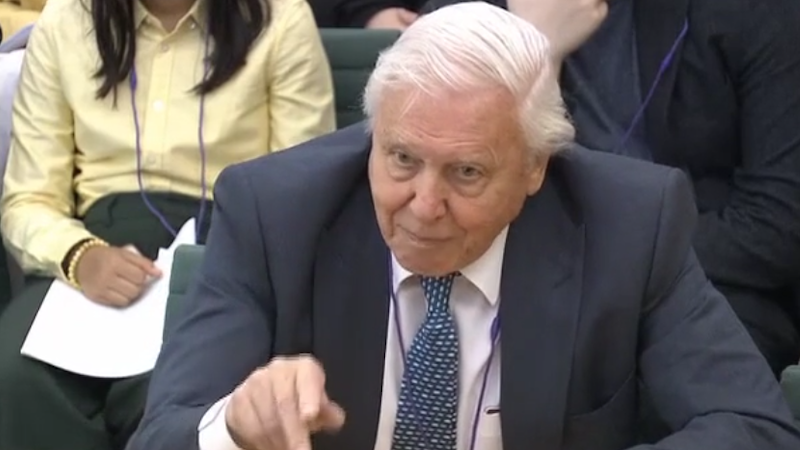Climate change and ecological breakdown may one day be viewed with the same universal repugnance as slavery, David Attenborough said on Tuesday.
Giving evidence to a committee of UK MPs, Attenborough said: “There was a time in the 19th century when it was perfectly acceptable for civilised human beings to think it was morally acceptable to actually own another human being as a slave.
“And somehow or other in the space of I suppose 20 or 30 years the public perception of that totally transformed. By the middle of the 19th century it was becoming intolerable.”
The naturalist then said that when it came to the environment, “we are right now in the beginning of a big change”.
The comments come two weeks after the UN’s special rapporteur on extreme poverty and human rights warned of a “climate apartheid”, in which the wealthy are able to escape the social and economic impacts of climate change, while the poor suffer.
Climate news straight to your inbox? Sign up here
Attenborough praised the global youth movement for being the “stimulus” for changing public understanding of environmental issues.
“The idealism of youth is something that should be treasured and respected,” he said.
Attenborough took aim at the US and Australia as countries where climate science denial was particularly strong. He said he was “sorry that there are people in power and internationally, notably the United States, but also in Australia” where “those voices are clearly heard” and hoped the “electorate will actually respond to those”.
Attenborough also said it would be “a very sad day” if Donald Trump succeeded in withdrawing the US from the Paris Agreement, praising the UN process as an example of international cooperation.
Labour MP Vernon Coaker, a member of the committee, said Attenborough had “drawn the youngest audience we’ve ever had” to the select committee room.
Climate Home News needs your help… We’re an independent news outlet dedicated to the most important global stories. If you can spare even a few dollars each month, it would make a huge difference to us. Our Patreon account is a safe and easy way to support our work.
The hearing was part of an inquiry into the government’s “Clean Growth Strategy”. In a wide-ranging discussion on environmental destruction and his career as a nature broadcaster for the BBC, Attenborough answered questions on the UK’s record on tackling climate change.
He said the UK had taken a leading role in investigating the science of climate change, praising British scientists who had been “foremost” on this issue. But said the country had a particular responsibility to solve it, asking: “Who started the problem? This country. It was the industrial revolution that started here.”
Responding to the argument that countries like the UK should not act because their contribution is smaller than that of larger economies like China, Attenborough said: “that is a very dismal, pessimistic view of life”.
He celebrated the recent approval of a 2050 net zero emissions target for the UK, explaining that it gives a “calibration to see where we are going and what we are aiming at”, while also warning it was a “tough target” and would “cost money”.
The UK Student Climate Network said Attenborough’s comments on the UK were “incredibly disappointing”.
The 2050 deadline “ignores our massive historical responsibility for carbon emissions and leaves millions in the global south facing displacement and death”, the group said on Twitter.
Reflecting on the fact his career as a broadcaster has involved him travelling by air “only too frequently”, Attenborough said the cost of plane tickets needed to reflect “what it costs in real terms, in terms of the environment”, in order to restrict growth, with the long-term solution being electric flight.
We’ve changed our rules on republication. Please read them here
